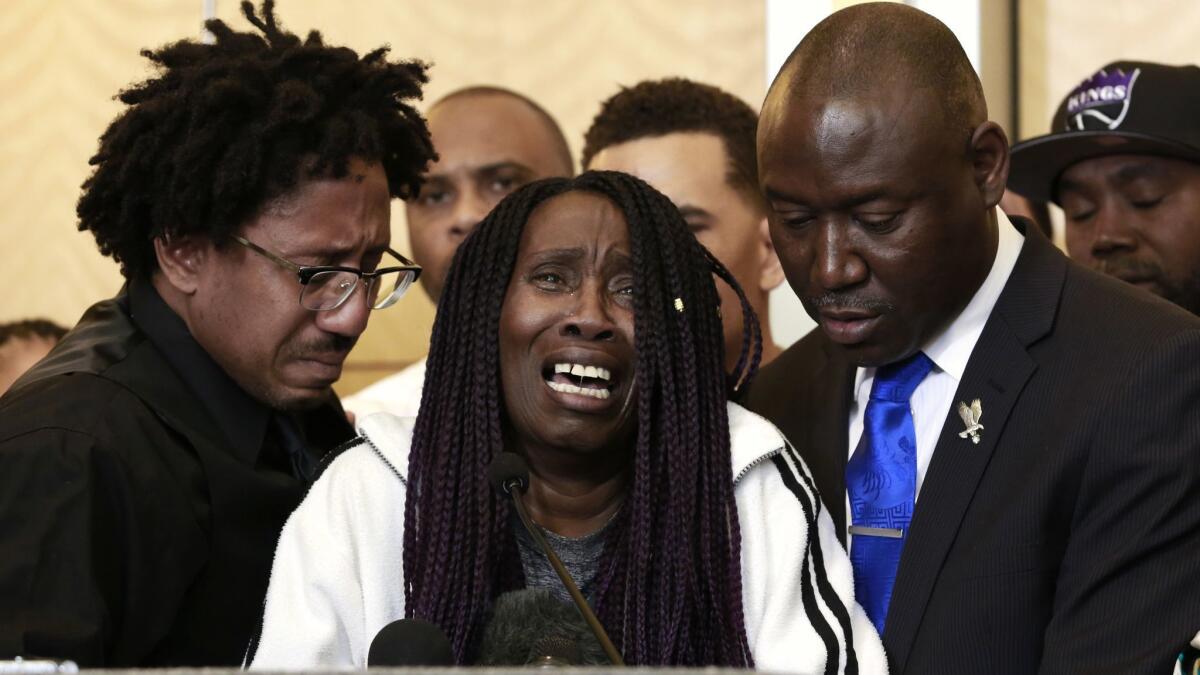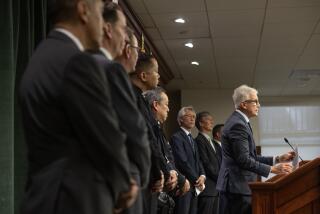As outrage over Stephon Clark’s killing grows, his grandmother asks: ‘Why? Why?’

- Share via
Reporting from SACRAMENTO — Between sobs and gasps, Sequita Thompson struggled Monday to recount her terror eight days ago when gunfire rocketed through her backyard.
“Call 911!” Thompson cried to her husband as she crawled out of the living room with her 7-year-old granddaughter in tow. Her husband told her he called police moments earlier after hearing someone tapping at the back window and calling to get in.
For the record:
12:50 p.m. March 27, 2018An earlier version of this article referred to Rep. Nancy Pelosi as House speaker. She is House minority leader.
It turned out the police were already in the backyard. Sacramento officers searching the neighborhood for a reported vandal encountered Thomas’ grandson Stephon Clark, who lived there with them. Police fired a reported 20 rounds at the 23-year-old. Videotapes of the encounter showed officers shouting “gun, gun, gun” before opening fire, but the only object discovered near the dead man was a cellphone.
“Why didn’t you shoot him in the arm? Shoot him in the legs? Send in dogs? Send in a Taser? Why? Why?” Thompson said Monday at a news conference held by black community leaders, officials from the NAACP. “Justice! I want justice for my baby! I want justice for Stephon Clark. Please give us justice!”
Clark’s killing sparked days of protests in Sacramento and widespread condemnations from people including House Minority Leader Nancy Pelosi (D-San Francisco) and celebrities such as Amy Schumer and Common.
But some of the people who have criticized police for opening fire on Clark also expressed support for how Sacramento officials have handled the incident.
Police quickly released officer videos of the shooting, as well as radio transmissions. During several tense standoffs with police — including one that blocked Interstate 5 and another that prevented fans from getting to a Sacramento Kings basketball game — they praised officers for showing restraint and preventing an escalation of tensions.
Alice Huffman, president of the NAACP California-Hawaii chapter, described the response as a model she said the organization hopes will become the “new normal” for handling of controversial police shootings. On Monday, she urged local prosecutors and the U.S. Justice Department to support an outside, independent investigation.
“We don’t believe the city can do this by itself,” Huffman said. She took issue with state law enforcement policies that protect officers who perceive someone to be a threat, she said, “putting the color blue ahead of people in America, especially black people.”
Sacramento’s mayor and police chief have urged residents to withhold judgment until the investigation is complete. But the shooting is increasingly becoming a national crusade.
A mass turnout of mourners is expected at the City Council chambers on Tuesday, while the Rev. Al Sharpton intends to deliver the eulogy Thursday at Clark’s funeral. Black Lives Matter demonstrators intend to camp outside the county prosecutor’s office from Tuesday through Thursday to demand criminal charges against the two officers who shot Clark.
Before their game Sunday, Sacramento Kings and Boston Celtics players wore T-shirts bearing Clark’s name. The black shirts had the words “Accountability. We Are One” emblazoned on the front and “#StephonClark” on the back.
Sacramento police already had changed some internal policies following earlier incidents in which officers killed African Americans. The city has equipped most officers with body cameras and enacted a policy to release those videos after the fatal police shooting in 2016 of Joseph Mann, a mentally ill man whom officers tried to run down with their cruiser.
African Americans make up about 14% of Sacramento’s population and about 4% of the city’s police officers. Some blacks say they don’t trust police and fear officers will harm them.
A woman who lives down the street from where Clark was shot described the South Sacramento neighborhood as “rough” and said police in the area are “aggressive” — speeding down its tree-lined streets with little regard for residents. Most of the homes have security doors; there is a heavy presence of fenced-in yard dogs and dilapidated vehicles.
Personal fear dominated her descriptions of the community, and she refused to give her name. She keeps her dog inside and escorts her 16-year-old son to tutoring because he is dark skinned, so police can “see someone of lighter skin walking with him at night.”
“I worry about my son coming home and being judged for someone doing something wrong,” she said.
On the night Clark was shot, she said, police tried to question her son about area gang activity but she refused to allow it.
Down the street, another woman who also declined to be identified said that in 2012, someone broke a window in her home and stole her jewelry. “As long as you stay inside your house, you’re good,” she said through her screen door.
A few houses down, Gino Casis worked on his front lawn. He described himself as an ardent supporter of police but “to kill people is bad.”
The incident that ended Clark’s life began when Sacramento officers responded around 9:15 p.m. to a call that a 6-foot-1 man wearing a black hoodie and dark pants was breaking into vehicles, authorities said. The caller said the man had broken car windows and was hiding in a backyard, according to the Sacramento Police Department.
A Sheriff’s Department helicopter circling overhead spotted a man in a backyard and directed police toward him, authorities said. Deputies told officers that the man had picked up a “toolbar” and broken a window to a home.
The man then was seen running south, toward the front of the house, where he stopped and was looking into another car, police said. Officers ordered the man to stop and show his hands, but that he ran. They chased him to the backyard, where, authorities say, he turned and advanced toward the officers “while holding an object which was extended in front of him.”
“The officers believed the suspect was pointing a firearm at them. Fearing for their safety, the officers fired their duty weapons, striking the suspect multiple times,” the Police Department said in a statement.
Clark was pronounced dead at the scene.
One issue that has received scrutiny is a moment in police videos when an officer is heard saying, “Hey, mute,” before the sound cuts off.
Sacramento’s police chief said the muting issue is part of the investigation, adding that “it builds suspicion.”
Clark’s family has hired as its lawyer civil rights litigator Ben Crump, whose client list has included the families of Trayvon Martin and Michael Brown.
Leaning on Crump for support, Clark family members on Monday made the first of what he warned must be a long travail of public appearances to keep a national spotlight fixed on Clark’s slaying. They wept as Thompson cried for justice. Later, Clark’s older brother, Stevante, jumped into the center of the press circle to lead loud chants of his brother’s name. A woman in the audience wailed.
In preparation for federal litigation against Sacramento, Crump said Monday that Clark’s family has requested an independent autopsy.
“No family should have to endure this pain and suffering as they try to seek answers for an execution of their loved one, who was only holding a cellphone,” Crump said.
Not all in Sacramento share the anger of the Clark family. A retired mail carrier named Ron, who refused to give his last name, showed up at City Hall on Monday to voice support for police officers.
“Those people don’t go out to create violence. They’re there to restore peace,” the 74-year-old said. “Most of the people I talk to share my view.”
paige.stjohn@latimes.com | Twitter: @paigestjohn
nicole.santacruz@latimes.com | Twitter: @nicolesantacruz
More to Read
Sign up for Essential California
The most important California stories and recommendations in your inbox every morning.
You may occasionally receive promotional content from the Los Angeles Times.















